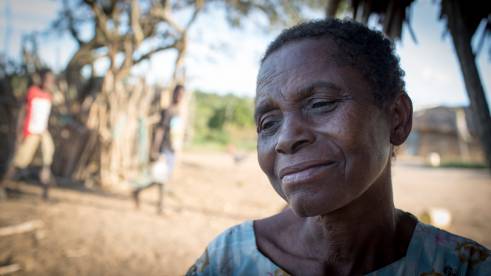By Beth Howgate
Today, World Elder Abuse Awareness Day, Age Demands Action campaigners in 40 countries will be calling for an end to elder abuse.
Nzingo’s story
Much of HelpAge’s work on elder abuse focuses on East Africa where there are a significant number of cases.
Nzingo, 67, from Kenya was abused by a relative, an attack which resulted in the death of her 90-year-old mother.
“The man slashed me on my head and I immediately fainted. I still don’t know what the reason was for that kind of brutality,” said Nzingo, whose attacker was arrested but later released on bail.
“I am very scared. I don’t sleep well. When I hear any noise I am alarmed. In my dreams I see that person following me,” she said.
A UN convention on older people’s rights
Age Demands Action activists will be encouraging their governments to attend the Open-ended Working Group on Ageing this July and support a UN convention to protect older people’s rights.
“A UN convention would take us a step closer to ensuring human rights are for everyone, at every stage of our lives,” said Bridget Sleap, Senior Rights Policy Advisor at HelpAge International.
Four older campaigners including Estha Wamera will go to the Open-ended Working Group on Ageing in New York to represent the world’s over 60s and lobby member states to agree to support them.
Campaigners on the ground
On 15 June, our affiliate, the Kenyan Society for People with AIDS, will host a procession through Siaya town to mark the day. National Kenyan media will be visiting an older people’s home whose residents have been abandoned.
In Bangladesh, campaigners will take part in street theatre to raise awareness of elder abuse.
Older people’s voices
Age Demands Action campaigners will be handing over a report by the Global Alliance on the Rights of Older People to ministers and decision makers. The report, based on consultations with older people across 50 countries, asks how they are discriminated against.
“Older people repeatedly say that they are considered useless, incompetent and a drain on resources by their families and by society,” said Sleap.
A resident from a nursing home in Serbia said: “In the home they terrorise us, they take all our money, they don’t give us allowances and they constantly threaten we’ll be kicked out if we don’t behave.”
Lack of data on elder abuse
Despite cases like Nzingo’s, older people’s right to be free from abuse is not protected under international law. Inadequate research into elder abuse makes tackling the problem difficult.
“Elder abuse is the least surveyed of the different types of violence in low-income countries according to the Global Status Report on Violence Prevention 2014,” said Sleap.
This report, by the World Health Organization and UN agencies, reveals that of the 133 countries surveyed, two thirds do not have adult protective services to support older people.
“Not enough is being done to stop this abuse and protect the rights of older people,” said Sleap.
Follow the conversation on twitter with #WEAAD2015 or show your support by tweeting:
